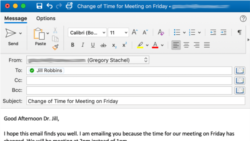Email is one of the most important ways through which we communicate. It has become part of most everyone’s day-to-day life.
Writing a good email can mean the difference between someone reading it and writing back, and someone ignoring it all together. Do you have questions on how to make your message more effective?
Today on Education Tips, we will answer the question, “How can I make my emails better?”
Emails are made up of four different parts:
- the subject line,
- the opening,
- the body, and
- the closing.
Let us explore how to make each of these parts better.
Subject line
The subject line is what the other person, or receiver, will read first. The subject line is usually the most important part of an email. It should be short but contain enough details that the receiver recognizes the subject of the email. A good subject line sets the expectations for the email. A bad subject line can mean the receiver will not read the email.
Some people will add the word “important” to the subject line, but this does not provide enough information. Instead of writing “important,” two better choices for subject lines are:
Meeting Tomorrow at 10am to Discuss New Changes
Question About Future Classes
Opening an email
As in any form of writing, you should know your audience. The opening of an email depends on things like how formal the relationship is.
If you are sending an email to a friend or someone you work with, two good openings or greetings are:
Good Morning/Afternoon,
Hello, or Hello [name],
If you are sending the email to someone you do not know and it is a formal situation, some possible openings are:
Dear [name of department],
To Whom it May Concern,
In a formal situation, when you know the name of the person, a good opening is simply:
Dear [title] [family name],
As in, Dear Mister Brown,
Body
The body of the email is where you ask for what you need or make clear your reason for writing the email. This could be asking them a question or keeping them informed. The body of the email should prioritize the most important information. It should be direct, and it is wise to keep it short.
If the person you are emailing does not know you, you should introduce yourself in the first few lines. You might write:
My name is Patricia Jones. I am sending this email to get some more information about the job you advertised.
After you have introduced yourself and given your reason for writing, you can follow this with the body of your email. The most important information should come first. This makes your email clear to your receiver and saves them time. Here is an example.
I wanted to know if you are currently accepting applications. If so, where can I send my information? Additionally, will you be meeting people in-person or online?
It is important to clearly explain yourself in as few words as possible. Try to keep your email short, but polite. This is important because you want to make yourself clear to your receiver.
Closings
The last part to a good email is the closing. It is usually one or two words that let the receiver know that this is the end of the email. The ending should include your name and tell the receiver where you work and what you do. A few different closings are:
Kind regards,
Best,
Thank you,
Some applications create an automatic signature for the sender. This is useful because it saves time when you are writing.
Example email
So, what does a completed email look like? Here is an example email:
If you follow these suggestions, you will find that you receive more responses to your emails. Effective email writing is important especially now when so much of what we do is online.
I’m Gregory Stachel.
And I’m Jill Robbins.
Gregory Stachel wrote this story for VOA Learning English. George Grow was the editor.
______________________________________________________
Words in This Story
audience – n. the people who watch, read, or listen to something
formal – adj. of language: suitable for serious or official speech and writing
prioritize – v. to make (something) the most important thing in a group
introduce – v. to make (someone) known to someone else by name
application – n. formal and usually written request for something (such as a job, admission to a school, a loan, or such
polite – adj. having or showing good manners or respect for other people
automatic – adj. of a machine or device: having controls that allow something to work or happen without being directly controlled by a person
signature – n. a person's name written in that person's handwriting or, on an electronic message, the person’s name and other contact information
response – n. something that is said or written as a reply to something
What do you think was the best advice in this story? We want to hear from you. Write to us in the Comments Section.






